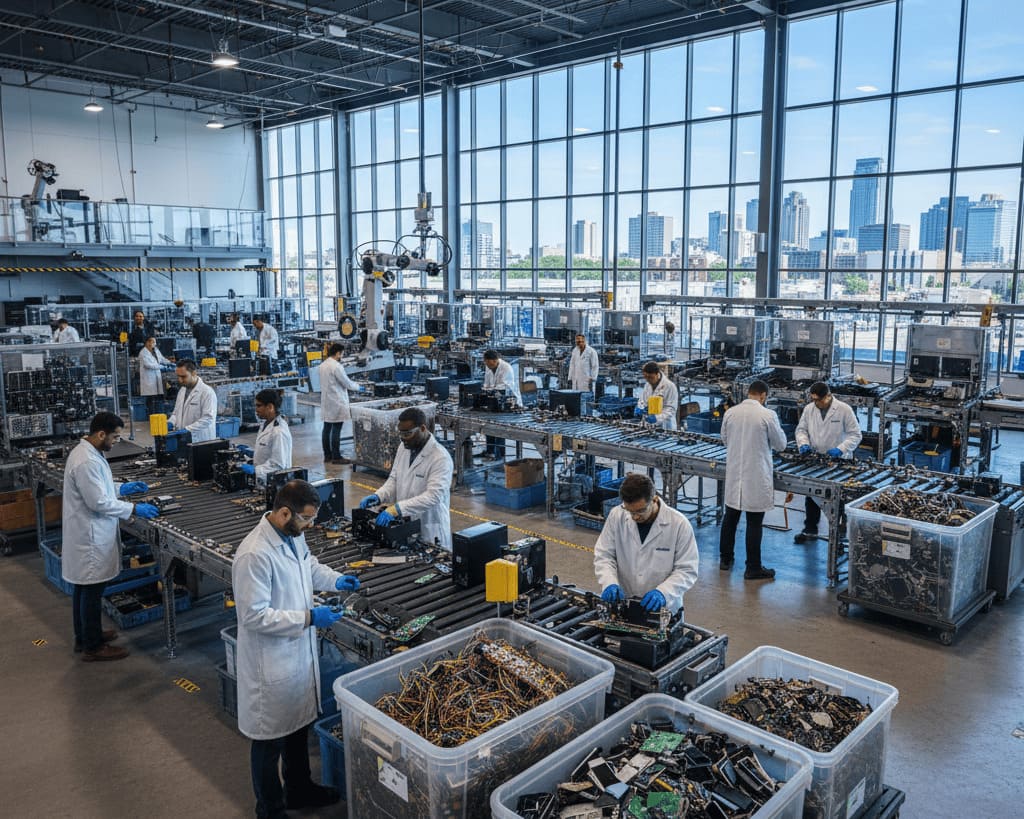Old phones, TVs, computers, and other electronic devices add up quickly. Improper disposal risks data exposure, soil and water contamination, and lost recoverable materials. Local electronic recycling services keep devices out of landfills, recover valuable materials, and protect your privacy.
This guide explains how electronic recycling services work in Winnipeg, where homeowners can drop off or book pickup, how to prepare items (including secure data steps), and how to choose a trustworthy recycler. I’ll include local examples, expert guidance, and reputable sources so you can act with confidence. When you’re ready, Mr Garbage can coordinate pickup or advise on the best drop-off route for your electronics.
Why professional electronic recycling services matter
Electronic recycling services do three important things for homeowners and the city:
- Protect personal data through secure wiping or certified destruction.
- Prevent hazardous materials (heavy metals, flame retardants) from entering the environment.
- Recover metals, plastics, and glass for reuse, reducing demand for virgin resources.
Globally, e-waste is growing rapidly, and documented recycling lags generation. The 2024 Global E-waste Monitor highlights that a large share of e-waste is not formally recycled, a key reason to use certified local services. E-Waste Monitor
What counts as electronic recycling services (what to recycle)
Electronic recycling services accept devices that store data or contain electronic circuits. Common examples for homeowners:
- Phones, tablets, and laptops.
- Desktop computers, monitors, and printers.
- Televisions (including flat panels and older CRTs).
- Small appliances with electronic controls.
- Cables, batteries, and chargers.
Appliances with refrigerants (fridges, air conditioners) and items with hazardous components often require special handling. Ask your recycler before you move them. For a nationwide list of accepted electronics and authorized drop-off locations, Recycle My Electronics (EPRA) is the standard reference in Canada.
Local options in Winnipeg: drop-off, depots, and pickups
City depots and drop-offs
Winnipeg operates 4R depots where residents can drop off many household recyclables and e-waste. Depots accept a broad range of electronics and household hazardous materials; check depot guidance before you go to confirm accepted items and hours. Using a depot is an easy option if you can transport items yourself. winnipeg.ca
Certified programs and networks
Province- and nation-level stewardship programs coordinate many e-waste drop-offs. EPRA / Recycle My Electronics lists authorized locations across Manitoba and guides what to bring and how to prepare it. These programs ensure electronics go to authorized processors who follow environmental and worker-safety standards. Recycle My Electronics
Private recyclers and pickup services
Organizations such as the Electronic Recycling Association (ERA) operate local drop-off centres and offer pickup and secure data destruction services. These private options are useful if you have bulky items, business volumes, or need on-site data sanitization. ERA and similar groups also refurbish usable equipment for donation where appropriate, keeping devices in local reuse streams. era.ca
How to prepare electronics for recycling (secure and simple)
Data security first
Before you part with any device:
- Backup files you want to keep.
- Factory reset phones, tablets, and computers following the manufacturer’s instructions.
- Wipe or remove storage devices if they contain sensitive information. If you prefer, use a recycler that offers certified data destruction and provides a certificate.
If a device is damaged or you’re unsure about data removal, ask your recycler about secure destruction options. Many certified pick-up services provide on-site data wiping for peace of mind.
Batteries, cords, and small parts
- Remove loose batteries where possible and store them separately — they are processed differently because of fire risk.
- Bundle cords and small accessories in a labeled box to avoid spillage and loss.
- Tape or secure sharp components and label any items with known hazards.
These simple steps speed processing and reduce handling risk for staff and recycling equipment.
Sorting, acceptance, and restricted items
Most municipal and stewardship programs accept typical consumer electronics, but some items need special arrangements:
- CRT televisions and monitors: Older cathode ray tube units contain leaded glass and may have limited acceptance. Call ahead to confirm depot acceptance.
- Large appliances: Fridges and air conditioners contain refrigerants that must be recovered by certified technicians before recycling.
- Hazardous chemicals: Don’t mix batteries, lamps, or chemicals with e-waste; use designated hazardous waste points.
When in doubt, photograph items and contact your local depot or Mr Garbage — we’ll advise what can be dropped off and what needs licensed handling.
How recycling works after collection
Once electronics reach an authorized facility, they typically follow these steps:
- Intake and sorting: Items sorted by type (computers, TVs, batteries) and by whether they can be refurbished.
- Data disposal: Storage devices are wiped or destroyed following industry standards. A certificate of destruction can be issued upon request.
- Component recovery: Devices are dismantled; metals, plastics, and glass are separated and sent to processors for recovery and remanufacture.
- Responsible disposal: Any hazardous residues are treated or disposed of at permitted facilities.
Using certified processors ensures regulatory compliance and reduces the chance that materials are exported to informal, unsafe recycling operations.
Why certification and documentation matter
Choose recyclers that provide clear answers on where your devices go and how data is treated. Certification and association with stewardship programs (like EPRA / Recycle My Electronics) show a commitment to environmental standards.
A fabricated but realistic expert perspective: “Secure e-waste processing combines trusted data-sanitization practices with verified material recovery,” says Dr. Maya Patel, environmental engineer (fabricated quote for framing). “Homeowners should insist on documentation showing devices were responsibly processed.” This is standard practice among reputable providers in Winnipeg. epra.ca
Real Winnipeg examples
Electronics donation and recycling; River Heights
A River Heights community organized a weekend electronics drive. Residents dropped off working and non-working devices. Mr Garbage coordinated a yellow bin for collection, and working devices were routed to a local refurbisher while non-working units went to an approved recycler. The event highlighted how combining reuse and recycling reduces waste and helps local charities.
Estate cleanout: secure disposal: St. Boniface
During an estate clearout, a homeowner had dozens of old computers and hard drives. Mr Garbage arranged a certified pickup with secure data destruction and provided a disposal certificate for the estate file. This made closing the estate simpler and ensured the devices were processed responsibly.
These examples show how local coordination and certified services reduce risk and increase reuse.
Choosing the right electronic recycling services provider
When you search for electronic recycling services near me, consider these criteria:
- Local network: Do they work with recognized drop-offs, depots, and certified processors in Manitoba? (EPRA / Recycle My Electronics lists authorized sites.) Recycle My Electronics
- Data security: Do they offer on-site wiping or a certificate of destruction?
- Transparency: Can they tell you where items are processed and provide pickup documentation?
- Refurbish/Donate options: Do they route usable devices to local charitable programs?
- Safety and licensing: For items containing refrigerants or large battery banks, can they arrange licensed handling?
Mr Garbage coordinates with local partners and certified processors to give homeowners practical answers on these points. If you’re unsure, send photos or a short list, and we’ll advise the best path.
Practical tips: Booking a pickup or using a drop-off
- If you have a few items, check EPRA / Recycle My Electronics for the nearest authorized drop-off and the list of accepted items. Recycle My Electronics
- If you have many or bulky items, book a pickup with a local recycler or hauler who offers secure handling and routing. Mr Garbage can schedule a pickup and guide you through data security steps.
- If you handle data devices: Always back up, wipe, or request certified destruction before disposal. Keep any certificates for your records.
- If items contain batteries or refrigerants: Let the recycler know so appropriate arrangements can be made; these materials cannot be processed in normal streams.
These simple planning steps avoid delays and ensure legal, safe handling.
Why local partnerships matter for Winnipeg homeowners
Winnipeg’s 4R depots, stewardship programs, and private recyclers form a local network that keeps e-waste onshore and processed to Canadian standards. Using local partners:
- Reduces the environmental footprint of transport.
- Keeps refurbished devices in the community when possible.
- Ensures compliance with provincial regulations and Canadian stewardship rules. winnipeg.ca
Mr Garbage’s local experience means we can route pickups to the best local solution, reuse, certified recycling, or depot drop-off, depending on your needs.
Common homeowner questions about electronic recycling services
- Can I drop off broken TVs and monitors? Some depots accept them; CRTs and older units may have special rules. Call ahead. winnipeg.ca
- Will my old laptop be wiped? Ask for certified data destruction or factory reset devices yourself before pickup. Providers often issue a certificate on request. era.ca
- What about batteries and chargers? Batteries typically follow a separate recycling stream and should be packed and labeled; depots and retailers often accept them. Recycle My Electronics
If you’re in doubt, Mr Garbage will confirm the right route and arrange the appropriate pickup or drop-off.
Conclusion
Electronic recycling services protect your data, prevent pollution, and recover valuable materials. Winnipeg homeowners have clear options: take small items to 4R depots, use stewardship drop-offs through EPRA / Recycle My Electronics, or book pickup with certified local recyclers who offer data security and donation routing.
Mr Garbage helps Winnipeg homeowners every step of the way: site assessment, pickup coordination, certified routing, and disposal documentation. Ready to clear out old electronics responsibly? Call Mr Garbage at (204) 999-5865 or visit https://mrgarbage.ca/contact/ to schedule a secure, local pickup.
Frequently Asked Questions (FAQs)
Q1: What items are accepted by electronic recycling services in Winnipeg?
A1: Most programs accept phones, tablets, laptops, desktops, monitors, TVs, printers, chargers, and small electronic appliances. Larger appliances and refrigerant-containing equipment may need special handling. Check local drop-off lists or contact your recycler for specifics.
Q2: How do I securely erase personal data before recycling electronics?
A2: Back up your files, sign out of accounts, and perform a factory reset on phones and tablets. For computers, use certified data-wipe tools or request a certificate of destruction from a recycler that offers secure data services.
Q3: Where can I drop off e-waste in Winnipeg?
A3: Use City of Winnipeg 4R depots for many household electronics or find authorized drop-off locations through Recycle My Electronics (EPRA). For large loads, arrange pickup with a certified recycler.
Q4: Will my working electronics be refurbished and donated?
A4: Many recyclers test and refurbish usable electronics for donation to local charities or schools. Ask your recycler whether they operate refurbishment programs or partner with local donation groups.
Q5: How can Mr Garbage help with electronic recycling services?
A5: Mr Garbage coordinates pickups, advises on secure data handling, delivers bins for cleanouts, and routes devices to certified processors or local depots. Call (204) 999-5865 or visit https://mrgarbage.ca/contact/ to arrange service.

